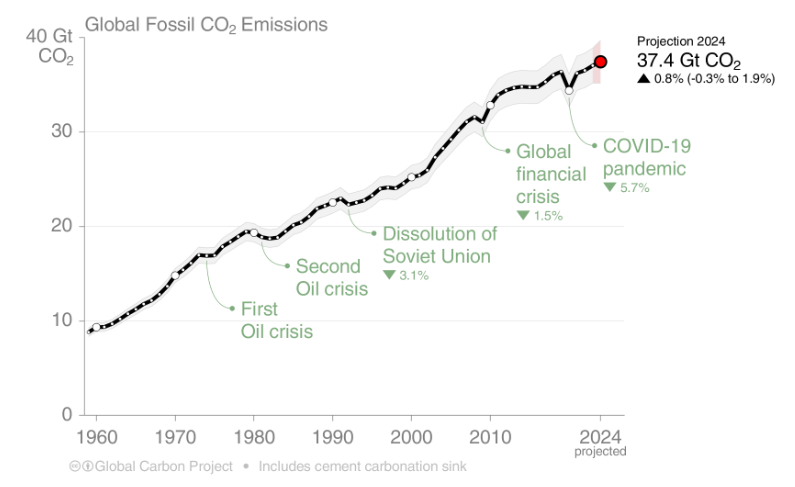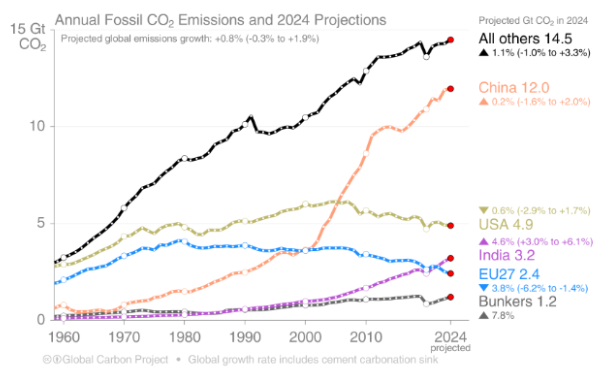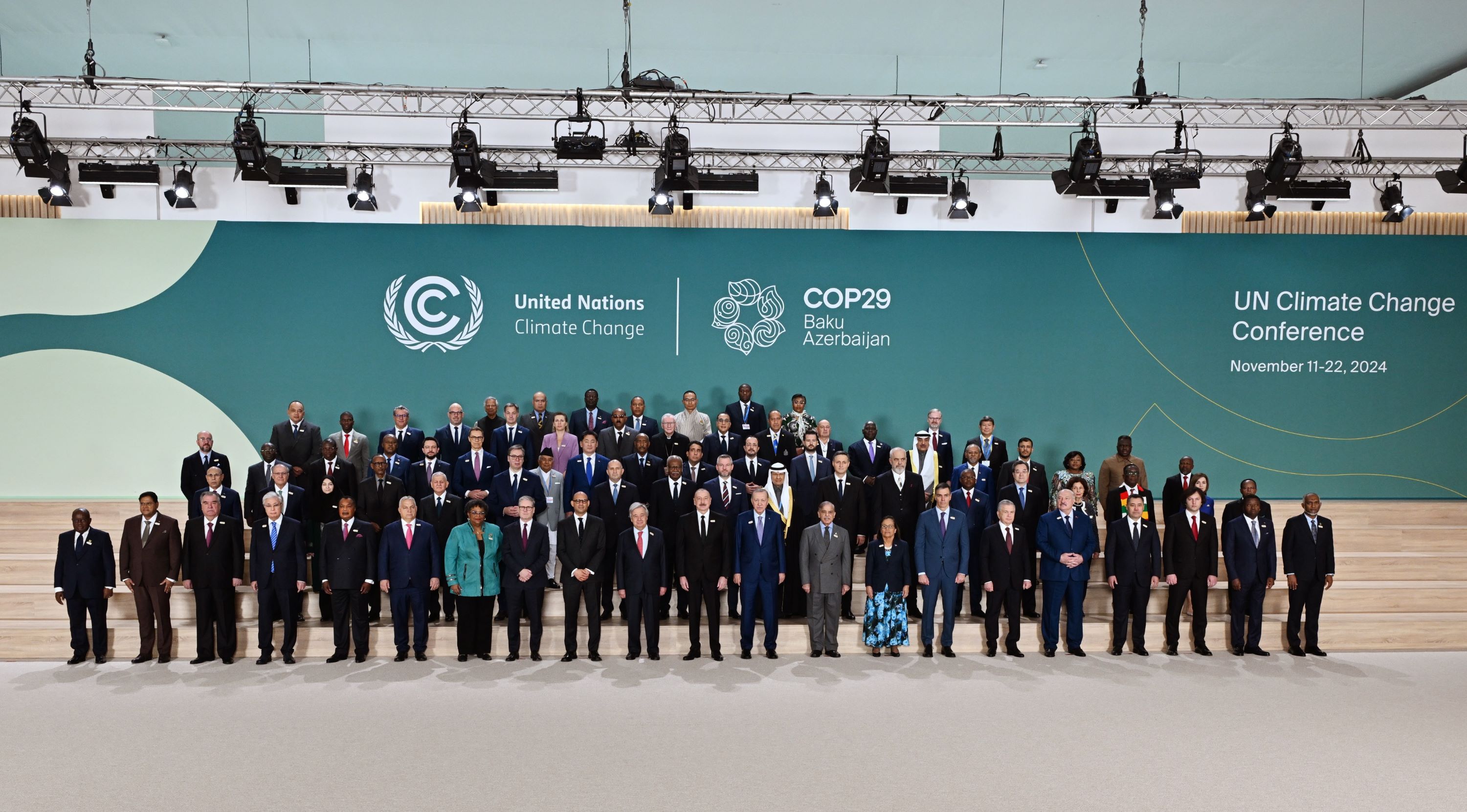Fossil CO2 emissions will continue to rise in 2024 to 37.4 billion tonnes, an increase of 0.8% over 2023 levels. This is one of the findings of the Global Carbon Budget 2024, the report that sets out the latest trends in global carbon emissions and their implications for meeting climate targets.
‘We haven't reached the peak yet,’ Pep Canadell, executive director of the Global Carbon Project, the international project behind the report, told a briefing at SMC Spain. Although emissions have not yet peaked, the increase is less than that recorded in 2023, which was 1.4%.
Emissions from land-use change (such as deforestation) remain high, with a projected 4.2 billion tonnes of CO2 in 2024, but have decreased every decade since the 1990s.

Overall CO2 emissions - the sum of fossil and land-use change emissions - have stabilised over the past decade and are projected to be 41.6 billion tonnes by the end of 2024. ‘The important thing to understand is that the big elephant in the room is fossil fuels,’ stressed Canadell, a senior researcher at the CSIRO Climate Science Centre in Canberra, Australia.
As for natural carbon sinks, which scrub incoming carbon dioxide, almost half of all anthropogenicCO2 emissions released into the atmosphere are absorbed by terrestrial and oceanic sinks. The El Niño phenomenon caused a reduction in the absorption capacity of terrestrial elements in 2023, the report shows, but it could recover by the second quarter of 2024.
If this rate continues, there is a 50-50 chance that global warming will exceed the 1.5°C limit in six years. Should this target be abandoned as unattainable? According to Copernicus provisional data from January to October 2024, it is ‘virtually certain’ that this year's average temperature will, for the first time, be more than 1.5°C above pre-industrial levels. ‘We are going to miss the 1.5°C target, but we should never stop thinking of it as our benchmark, otherwise we would go to 1.6, then 1.7 and so on up to 5°C,’ Canadell said. ‘If we pass it, we have to work even harder, faster and more aggressively on decarbonisation trajectories,’ he added.
Trump's return in the framework of a new COP
This edition of the annual Global Carbon Budget is the nineteenth and works with millions of real data, together with a projection for a few months into 2024. Its results will be presented at COP29 in Baku and the report is published in preprint in the journal Earth System Science Data. More than 120 scientists from more than 80 research centres and universities around the world have participated in its preparation.
By country, both Europe and the United States will continue to reduce their emissions levels, but India will not. China could slightly increase its 2023 values, although the model also estimates that these could fall slightly, which would be the first time this has happened. This could be explained, according to Canadell, by lower-than-expected economic growth in the Asian powerhouse.

How will the arrival of Donald Trump as the new US president affect US emissions? ‘Trump has the potential to slow down or slow down this drop in emissions. But I don't think he can reverse what already exists because, in large part, it has been due to economic factors,’ says Canadell, referring to the US's strong commitment to gas over coal in recent years, as it is much cheaper. In addition, it is the states that are betting on renewable energies, independently of the federal government, and this could continue to be the case.
‘Perhaps the most important thing is that we are going to have a lack of global leadership from the United States,’ the expert points out. This lack of leadership could mean that other smaller countries, seeing that the United States, as the second most polluting power in the world (behind China), is not getting involved, will not get involved either.
The report also notes that fossilCO2 emissions fell in 22 countries, including the United States and Spain, while their economies grew. As for technologies to remove or store carbon dioxide from the atmosphere, their weight remains negligible. ‘We cannot replace natural sinks,’ Canadell stressed. ‘We cannot create in an industrial way anything equivalent. There will be an industrial component of takingCO2 out of the atmosphere, but it will be modest,’ he added.
With a view to the Baku COP, where the main protagonist, although he is not yet president, will be Donald Trump, Canadell is optimistic: ‘The morale of Baku will be very important. It's easy to think that morale will be low because of Trump's victory, but Baku has to show that a country is not in charge of a decades-long commitment to decarbonisation that we have made’.
Reactions from independent researchers
SMC Spain has collected assessments from independent experts who did not participate in the report. ‘The Global Carbon Budget identifies natural gas as one of the main drivers of global carbon emissions. Emissions from natural gas worldwide are growing faster than those from coal and oil. Given that 22% of global emissions are produced by the use of natural gas, this fuel should be a focus for the development of global decarbonisation strategies,’ says Vanesa Castán Broto, Professor of Urban Climate Planning at the University of Sheffield (UK).
For her part, Ana Hernández, a researcher in Sustainability at the Foundation for Climate Research, has noted that by 2024, the concentration of atmospheric CO₂ is expected to reach a record average of 422.5 parts per million, 52% above pre-industrial levels. ‘This is a worrying setback to global commitments to reduce emissions and reach net zero by 2050. Furthermore, this persistent and growing accumulation of CO₂ in the atmosphere puts the goal of limiting global temperature increase to 1.5°C, 1.7°C, or even 2°C above pre-industrial levels further and further away, which represents a crucial challenge for climate change mitigation and the sustainability of the planet,’ she says.
Ana Cristina Franco Novela also highlights the projections related to global temperature increase. ‘To avoid exceeding this temperature limit, anthropogenic carbon emissions must be drastically reduced. At present, technologies to deliberately remove carbon dioxide from the atmosphere do not play a relevant role in counteracting anthropogenic carbon emissions,’ says the researcher from the Department of Earth Sciences - Climate Variability and Change at the Barcelona Supercomputing Center.
As for the limitations of the report, the director of BC3 (Basque Centre for Climate Change Research), María José Sanz, points out that they derive from the existence of and access to good quality empirical data, ‘which the Global Carbon Project itself has helped to promote by increasingly integrating different communities of experts, and the need, in these cases, to derive this information indirectly’.




